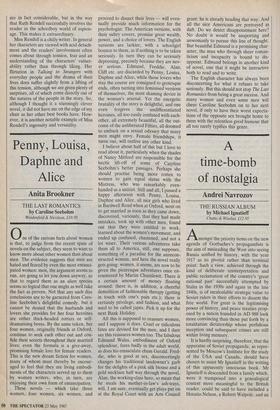Penny, Louisa, Daphne and Alice
Anita Brookner
THE LAST ROMANTICS by Caroline Seebohm
Weidenfeld & Nicolson, f10.95
0 ne of the curious facts about women is that, to judge from the recent spate of novels on the subject, they seem to want to know more about other women than about men. The evidence suggests that men are hated and feared by even the most emanci- pated women: men, the argument seems to run, are going to let you down anyway, so that to regard them as an alien species seems so logical that one might as well take the fact as proven. Not that any such dire conclusions are to be garnered from Caro- line Seebohm's delightful comedy, but it cannot be denied that the husbands and lovers she provides for her four heroines are either thick-headed rotters or self- dramatising bores. By the same token, her four women, originally friends at Oxford, continue to seek each other out and con- fide their secrets throughout their married lives: even the formula is a give-away, promising female lore for female readers. This is the new dream fiction for women, many of whom must thereby be encour- aged to feel that they are living embodi- ments of the characters served up to them by women writers, who, in turn, are enjoying their own form of emancipation.
These novels — which take three women, four women, six women, and proceed to dissect their lives — will even- tually provide much information for the psychologist. The American versions, with their sultry covers, promise great wealth, power, and a choice of lovers. The English versions are larkier, with a schoolgirl bounce to them, as if nothing is to be taken seriously. In turn they can be seriously depressing, precisely because they are nev- er serious. Edmund, Freddie, Alan, Cliff etc. are discarded by Penny, Louisa, Daphne and Alice, while those lovers who stay the course are consigned to grotesque ends, often turning into feminised versions of themselves, the most shaming device in the woman's arsenal. Yet the energetic brutality of the story is delightful, and one even forgives the undifferentiated heroines, all too easily confused with each- other, all extremely beautiful, all the out- come of the unliberated Fifties, all doomed to embark on a sexual odyssey that many men might envy. Female friendships, it turns out, will outlive any other kind.
I believe about half of this but I love to read about it, particularly when the shades of Nancy Mitford are responsible for the hectic lift-off of some of Car,oline Seebohm's better passages. Perhaps she should practise being more rotten to women to gain equal status with the Mistress, who was remarkably even- handed as a satirist. Still and all, I passed a happy afternoon with Penny, Louisa, Daphne and Alice, all nice girls who lived in Bardwell Road when at Oxford, went on to get married as soon as they came down, discovered, variously, that they had made mistakes, took up with other men, found out that they were entitled to work, learned about the women's movement, and ended up confused, chastened, and not a lot wiser. Their various adventures take them all to America, still, one supposes, something of a paradise for the unrecon- structed woman, and here the novel really gets going: women, it seems, are now to be given the picaresque adventures once en- countered by Martin Chuzzlewit. There is a certain amount of money floating around: there is, in addition, a cheerful demolition of fashionable therapy (getting in touch with one's pain etc.); there is certainly privilege, and fashion, and what used to be called japes. Pick it up for the next Bank Holiday.
All this is supposed to reassure women, and I suppose it does. Cruel or ridiculous fates are devised for the men, and I dare say this reassures women too. The fabulous Edmund Wales, embodiment of Oxford splendour, fares badly in the adult world, as does his emasculate chum Gerald. Fred- die, who is good at sex, disconcertingly changes his traditional landowner's garb for the delights of a pink silk blouse and a gold necklace half way through the novel. Alan, the working-class hero, so mean that he steals his mother-in-law's ash-trays, will, I am sure, eventually get plays put on at the Royal Court with an Arts Council grant: he is already heading that way. And all the nice Americans are portrayed as daft. Do we detect disappointment here? No doubt it would be unsporting and unwomanly to pursue this line of thought. But beautiful Edmund is a promising char- acter, the man who through sheer roman- ticism and incapacity is bound to dis- appoint. Edmund belongs in another kind of novel, one that it might be instructive both to read and to write.
The English character has always been disconcerting for what it refuses to take seriously. But this should not stop The Last Romantics from being a great success. And many women and even some men will cheer Caroline Seebohm on to her next novel, if only to have their worst expecta- tions of the opposite sex brought home to them with the relentless good humour that all too rarely typifies this genre.









































































 Previous page
Previous page